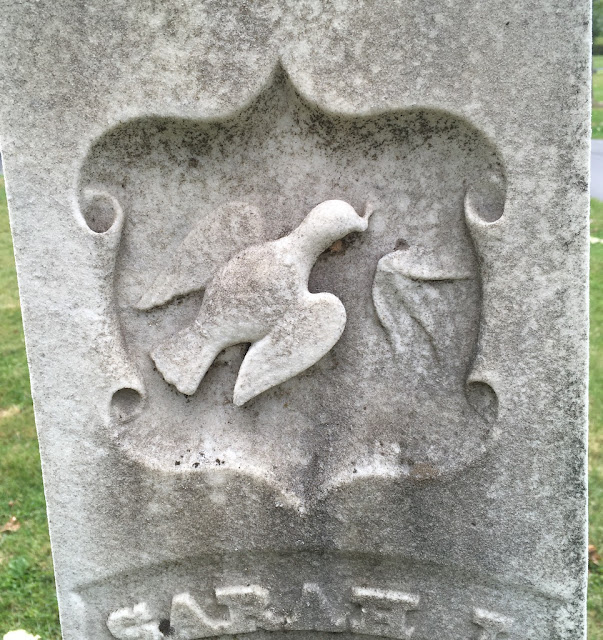If you wander around Weston Cemetery, you will notice that many markers have images on them in addition to the names and dates. For recent markers these images, often small flowers, are mostly decorative. Below is an example from a large marker.
Here is another large floral decoration, this on an older grave. Because it is on an older grave, it may be more than decorative. Most of the images on older graves have symbolic meaning. Flowers in general symbolize the fragility of life. Specific flowers have additional meaning, but I am not sure what kind of flowers these are supposed to be.A broken stem on a flower, as in this lily, indicates a life cut short. They are found on markers for children. The lily represents innocence.
Here is another broken stem, this with a bud on it, indicating that the life ended before it bloomed. Several markers with this motif can be found in the oldest section of Weston Cemetery. However, the most common symbol on the headstones for children is a lamb, some so eroded that they are hard to recognize.
A downward-pointing hand represents God reaching down for a soul. In this marker the soul seems to be represented by a flower, possibly a rose.
A finger pointing up represents the hope of heaven or that the soul has gone to heaven. Here it is holding a bud, so the deceased was a child.
The upward pointing finger is quite common in the oldest section of Weston Cemetery. This one adds the words, "To Heaven."
Doves can have several symbolic meanings. A dove with an olive branch can symbolize that the soul has found peace.
The image below is one of my favorite images in Weston Cemetery. The crown here seems to represent a triumph or victory over death.
Below is another marker with buildings, but the wording indicates that they represent the many mansions in heaven.
An anchor is a Christian symbol of hope.
The hourglass represents the passage of time or that the sands of life have run out. It is often pictured with a scythe, meaning that God has harvested the soul.Some old cemeteries have images of hourglasses with wings, indicating that life is fleeting. I have not seen this symbolism in Weston Cemetery. In fact, this is the only hourglass I have found.
The above pictures are only a small sample of the images one can find in Weston Cemetery. I have relied on the Internet for explanations of what the images symbolize and there may be better explanations for some of them. If you have one, feel free to share it with a comment.






















Thank you; interesting to have the illustrations/explanations here together.
ReplyDeleteThank you for the lesson in headstone designs. This could be a fascinating side aspect of the Cemetery Walk.
ReplyDeleteI really liked this post. I find old symbolism fascinating and neat.
ReplyDeleteLove this post. Keep up the cemetery work for the walk. You are sensitive to this Weston Cemetery.
ReplyDeleteI learned a lot. Thanks I enjoyed this post
ReplyDeleteVery interesting post! Made me look at graves at a historic cemetery near me. There were several stone tree stumps in that cemetery (unsure if they are there at Weston). A quick search revealed that the stone trunks are likely to be from the Modern Woodmen of America.
ReplyDeletehttp://agraveinterest.blogspot.com/2011/06/modern-woodmen-of-america.html?m=1
Another point of interest is that one could order these stone tree trunks from Sears & Roebuck or Montgomery Ward.